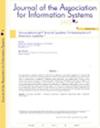正面评价还是负面评价?消费者在寻找和评价网络评论中的选择性暴露
IF 5.5
3区 管理学
Q1 COMPUTER SCIENCE, INFORMATION SYSTEMS
引用次数: 0
摘要
正面评论和负面评论对产品销售的影响方式和原因不同,对研究和商业都有至关重要的意义。尽管早期的在线口碑研究化学地证明了负面评论比正面评论对产品销售的影响更大(即消极偏见),但后来的研究表明,正面评论通常更有帮助(即积极偏见)。我们提出,这个难题的答案可能是负面评论比正面评论得到更多的曝光。由于消费者经常被大量的在线评论所淹没,他们在搜索评论时需要有选择性。本研究考察了消费者在决策过程中信息寻求和信息评价两个阶段对正面评价和负面评价的偏好。根据动机推理文献,我们提出消费者在搜索评论阅读时表现出消极偏见,但在评估评论的有用性时表现出确认偏见。我们进行了三个实验,并发现了对这些假设的一致支持。我们的研究结果将目前对消费者在线评论处理的理解扩展到信息寻求阶段,揭示了不同阶段的差异偏见,为产品销售中的消极偏见提供了可能的解释,并提供了重要的实践意义。本文章由计算机程序翻译,如有差异,请以英文原文为准。
Positive or Negative Reviews? Consumers' Selective Exposure in Seeking and Evaluating Online Reviews
How and why positive and negative reviews influence product sales differently has critical implications for both research and businesses. Although earlier online word-of-mouth research empirically documented that negative reviews influence product sales to a greater extent than positive reviews (i.e., a negativity bias), later research has revealed that positive reviews are generally more helpful (i.e., a positivity bias). We propose that an answer to this conundrum may be that negative reviews get more exposure than positive reviews. As consumers are often overwhelmed by the massive number of online reviews, they need to be selective when searching for reviews. This research investigates consumers’ preference for positive vs. negative reviews during both the information-seeking and information-evaluation stages of their decision-making process. Drawing on the motivated reasoning literature, we propose that consumers exhibit a negativity bias when they search for reviews to read but manifest a confirmation bias when they evaluate the helpfulness of reviews. We conducted three experiments and found consistent support for these hypotheses. Our findings expand the current understanding of consumers’ processing of online reviews to the information-seeking stage, reveal differential biases at different stages, demonstrate a possible explanation for the negativity bias in product sales, and provide important practical implications.
求助全文
通过发布文献求助,成功后即可免费获取论文全文。
去求助
来源期刊

Journal of the Association for Information Systems
工程技术-计算机:信息系统
CiteScore
11.20
自引率
5.20%
发文量
33
审稿时长
>12 weeks
期刊介绍:
The Journal of the Association for Information Systems (JAIS), the flagship journal of the Association for Information Systems, publishes the highest quality scholarship in the field of information systems. It is inclusive in topics, level and unit of analysis, theory, method and philosophical and research approach, reflecting all aspects of Information Systems globally. The Journal promotes innovative, interesting and rigorously developed conceptual and empirical contributions and encourages theory based multi- or inter-disciplinary research.
 求助内容:
求助内容: 应助结果提醒方式:
应助结果提醒方式:


